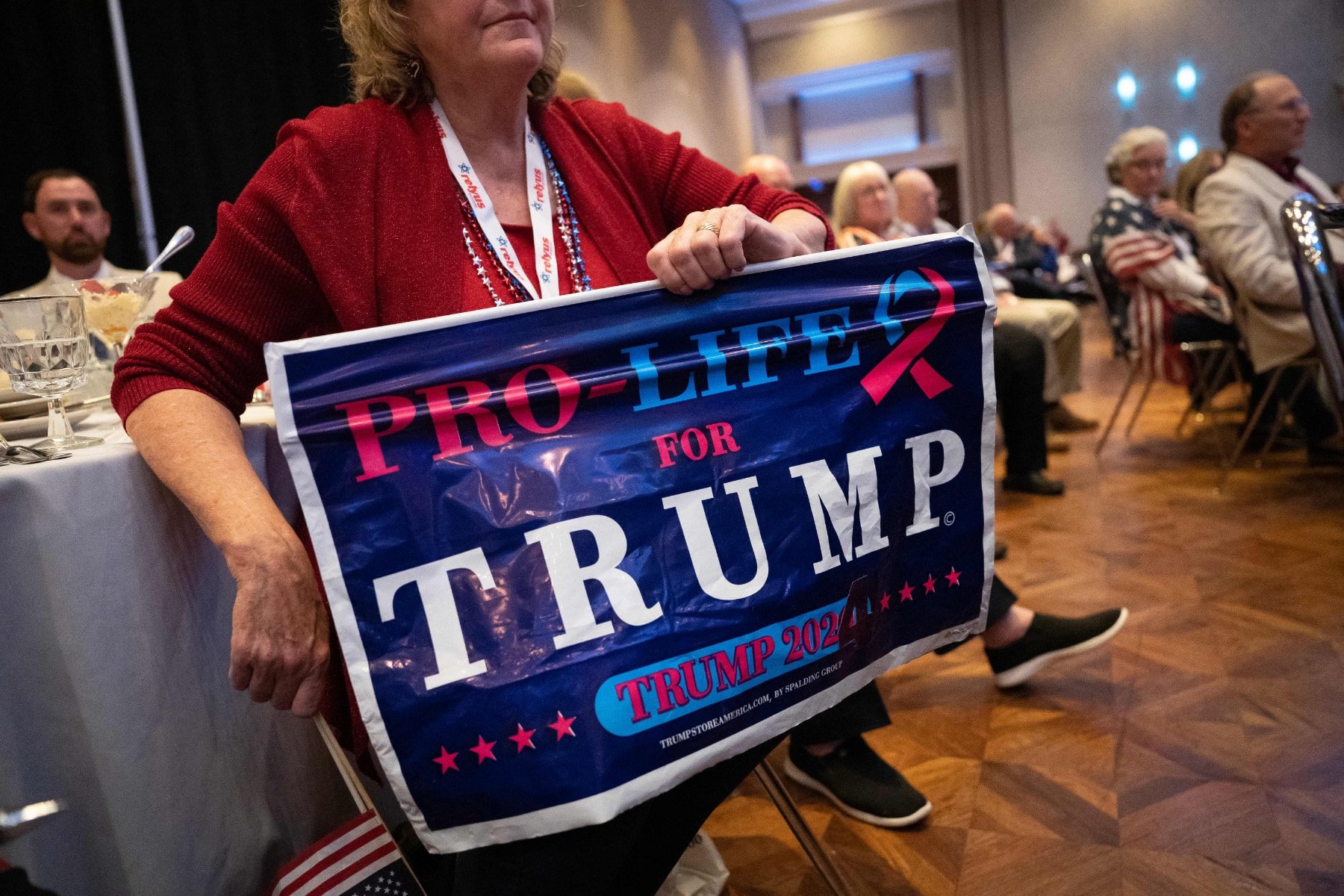Donald Trump, the front-runner for the Republican presidential nomination, has cast abortion to the background of his campaign and declined calls to champion a national abortion ban.
But, if reelected, Trump’s tune could change: Without the aid of Congress, the former president would have tools to quickly curtail access to the procedure — and the pressure on him to wield them has already started.
Despite equivocating over decades on whether he supported abortion rights, Trump was in his previous term one of the anti-abortion movement’s most dependable presidents. His record as the president who helped bring down Roe v. Wade, the personnel who staffed his administration, and his wide-ranging allyship with evangelical leaders and anti-abortion groups suggest a willingness to further restrict access, abortion scholars and political analysts said.
“He’s always been dodgy [on abortion], and deep down he is dodgy on it. But he’ll listen to the people around him — he did it in his first term,” said Molly Murphy, a pollster and president at the Democratic-aligned firm Impact Research who tracks abortion-related public opinion. “He’d trade on this issue to get something he wants, which is why I think it would be very much on the chopping block. The people willing to work with him will deeply care about it.”
While a national ban appears unlikely to get sufficient support in Congress — a 2022 effort from Sen. Lindsey Graham failed to gain traction even among his colleagues — the administration can act on its own. With Roe overturned, and the anti-abortion movement subsequently emboldened, their options are far-reaching.
“There are lots of differences between what happened in the first Trump administration and what would be happening now — starting with the fact that there’s no more Roe and continuing through the fact that the Republican Party has been much less expressive about abortion since Dobbs,” said Mary Ziegler, a historian who studies the anti-abortion movement. “But there are signs that there may be more continuity between the first and second Trump administration than you might expect.”
-
Read Next:
Trump was the first president to attend the March for Life, the nation’s largest anti-abortion rally. Under his watch, the Department of Health and Human Services (HHS) barred health clinics that referred patients for abortion services from receiving federal funds under a family planning program. The change cut off federal funds from more than 1,000 clinics, including more than 400 Planned Parenthood affiliates. The Office of Refugee Resettlement, which is in charge of minors who are in immigration custody, sought to block pregnant teenagers from getting abortions.
Those actions earned credibility with evangelical leaders and anti-abortion groups. Marjorie Dannenfelser, president of the anti-abortion group SBA Pro-Life America, said last year that her group wouldn’t back a GOP presidential nominee who didn’t get behind a 15-week national ban. A month later she signaled the group was open to backing Trump anyway. Dannenfelser told The Washington Post earlier this month that Trump had “built an enormous amount of trust with pro-life voters, as his presidency was the most consequential in American history for the pro-life cause.”
Since underperforming in the 2022 midterm elections, Republicans have heightened their focus on limiting abortions later in pregnancy. But if elected, Trump — or any anti-abortion president — would be empowered to significantly limit access in the earlier stages of pregnancy.
Medication abortion approval
A new Trump administration could force the Food and Drug Administration (FDA) to remove mifepristone — one of two drugs most commonly used in medication abortions — from the market. Such a change would affect abortions in all states, including where the procedure is legal. Historically, the FDA has been treated in Washington as a federal agency more insulated from partisan politics. A second Trump tenure could test that.
Already, anti-abortion activists have been pushing for this, most prominently through a lawsuit filed in Texas set to be argued March 26 at the Supreme Court.
Even if the Supreme Court challenge fails, removing mifepristone is the centerpiece of anti-abortion strategy laid out by Roger Severino, who headed the HHS Office of Civil Rights in Trump’s previous administration and is now a vice president at the Heritage Foundation, a conservative think tank that has shaped the GOP’s agenda for decades.
Medication abortions are possible without mifepristone. For abortions, patients can take larger doses of misoprostol. But the misoprostol-only regimen is known to be less effective and more painful. Physicians have already expressed concern that removing mifepristone would increase the risk of dangerous side effects, including heavy bleeding. Mifepristone is also used to treat miscarriage, and any change in regulation would also affect that care as well.
The Comstock Act
Gene Hamilton, a lawyer who worked in Trump’s Justice Department, in a similar document urged the next Republican president to launch a campaign to enforce the criminal prohibitions on mailing abortion medications “against providers and distributors of such pills.” Roe v. Wade previously barred enforcement of the statute, an 1873 anti-obscenity law known as the Comstock Act.
Potential enforcement of Comstock, which was written to curtail material “intended for producing abortion, or for any indecent or immoral use,” has emerged as a key strategy for anti-abortion activists to restrict access to abortion medications. But though the law’s anti-abortion provisions were never repealed, using it to bar access to abortion is legally controversial. President Joe Biden’s administration has said that it does not interpret the law to prohibit mailing mifepristone.
Representatives from the Heritage Foundation did not respond to requests for comment. But multiple legal scholars said Severino’s and Hamilton’s writings — part of a project known as Project 2025, a purported roadmap of executive actions a future Republican president could take on a range of issues — offer a window into what policies could be on the table under Trump.
Contraception implications
The implications could go beyond abortion, extending to potentially restricting access to birth control, Ziegler said. Some anti-abortion organizations and lawmakers have argued that emergency contraception is considered an “abortifacient,” and should be similarly restricted — a characterization echoed by the Heritage Foundation papers. Students for Life, the anti-abortion group, has been specifically critical of the continued legality of hormonal birth control pills.
“If it’s the position of people at Heritage or former Trump administration officials that emergency contraception is an abortifacient, or hormonal birth control pill is, then they could try to apply Comstock to those,” Ziegler said.
Medically, using neither emergency contraception nor hormonal birth control is considered terminating a pregnancy.
Protests at abortion clinics
The Heritage Foundation is also calling on the next Republican president to review the administration’s enforcement of a law that protects access to the entrance of abortion clinics, which Hamilton said has been used to “harass pro-life demonstrators.” Earlier this month, former Vice President Mike Pence, during a conference with young anti-abortion activists, said the next conservative president should order the Justice Department to stop investigations and prosecutions of these demonstrators.
Even if Trump doesn’t adhere to the Heritage playbook, a second Trump administration would likely represent a meaningful shift in the federal landscape for reproductive rights.
The Biden administration has argued in court that federal emergency medicine law protects access to abortion in cases where the procedure would be life-saving, even in states with near-total abortion bans. It has similarly defended the FDA’s approval of mifepristone in the pending Supreme Court challenge, and sought to make abortions available to veterans through the Veterans Health Administration and reimburse service members for travel costs if they need to cross state lines for abortion care.
In a conservative administration, legal scholars suggested, the federal government could go as far as undercutting state abortion protections by challenging them in court.
“So far, there’s been a Department of Justice and FDA that’s argued on the side of evidence that abortion restrictions harm people. That all goes away, potentially,” said Rachel Rebouché, dean at the Temple University School of Law.

Kevin Roberts, president of the Heritage Foundation, called the Republican Party a “fickle ally in the fight for the unborn” and said the anti-abortion movement would continue pushing the party to act.
“Across the country, pro-life bills have failed, abortion referenda have passed, Democrat leaders are crowing, while too many Republican leaders are cowering from the fight,” Roberts wrote in an op-ed marking the anniversary of Roe and urging anti-abortion activists to demand action. “If it were up to the Republican establishment, the pro-life movement would simply go away. Thank God it’s not up to them. It’s up to you.”
These proposed moves to restrict abortion with presidential power would clash with the views of most Americans, and even a growing share of Republican voters, according to researchers tracking public opinion on the issue.
A July 2022 survey from the Public Religion Research Institute (PRRI) found that 56 percent of Republicans would oppose restricting medication abortions, compared with 72 percent of all Americans and 92 percent of Democrats. Among White evangelicals, opposition to such policies drops to 48 percent. The same survey found that 77 percent of Republicans would oppose laws that restricted the types of birth control people could use to prevent pregnancy.
“A lack of public support hasn’t stopped red state Republicans from enacting very stringent restrictions even in the face of public opposition to such policies,” said PRRI CEO Melissa Deckman.
Tresa Undem, a public opinion researcher, said data suggests voters are increasingly wary of such restrictions.
“A growing sentiment that we’re seeing post Dobbs is that politicians should have absolutely no say in this issue, and that it’s too political. Getting in the business of what prescriptions get mailed could be risky for Republicans,” Undem said.
Undem added that she’s noted a shift away from prioritizing abortion as a policy issue among some Republican voters, particularly men. The shift, she said, didn’t happen after Dobbs, but rather after the 2022 midterm elections when Republicans underperformed expectations amid Democrats’ heavy emphasis on reproductive rights.
It may shape how these voters approach the issue as they head to the ballot box. Cheryl Howse, 52, a Republican voter from Atkinson, New Hampshire, who spoke to The 19th before that state’s primary, said she doesn’t support abortions but is not asking Republican candidates to amplify that view on the trail.
“I happen to be pro-life, but it’s not a hill to die for Republicans,” Howse said. “I know most Americans want abortions to be legal up to a certain point.”






